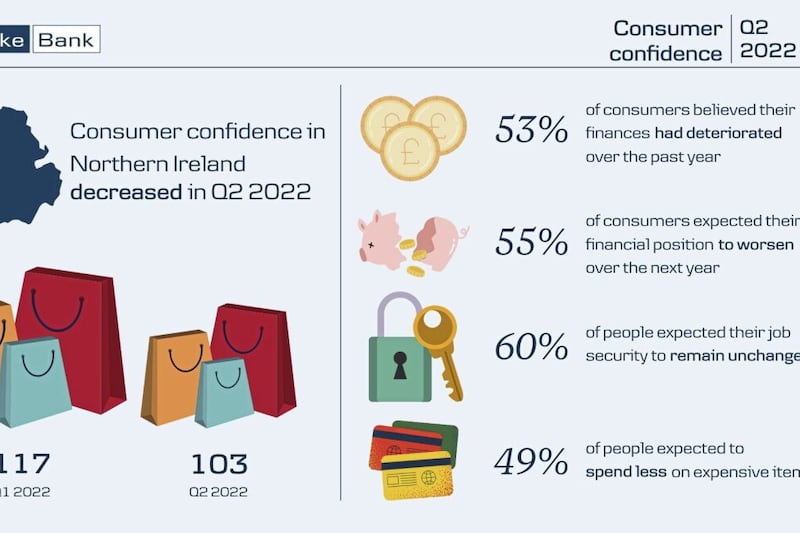Last week, Philip Hammond delivered his first, and last, spring Budget. Like all Budgets, there were some giveaways and some handouts, but from a macro-economic viewpoint there were no game changers.
From a local perspective, there was not much unique to Northern Ireland. Some of the main measures announced related to social care and education but these will not apply here as control over these areas has been devolved. But the Chancellor did provide some additional funding for a new Executive.
The announcement that generated the most headlines was the Chancellor’s decision to increase national insurance contributions for the self-employed. There are 130,000 self-employed people in Northern Ireland and this translates into a self-employment rate of 15.5 per cent, which is above the UK average of 15 per cent.
While the amount that some self-employed individuals have to pay will rise, it is unlikely that these changes alone will have major implications for the number of self-employed people in Northern Ireland.
A key focus of this government is to boost the UK’s weak productivity performance. Driving up productivity growth is not a straightforward task and there is no silver bullet.
Boosting productivity requires targeted policy action including developing hard infrastructure, such as improved local and international transport links, and to build the digital infrastructure that many individuals and businesses now rely on. Alongside this, it is vital to have a workforce with the skills that the business community needs to thrive.
The Chancellor used last year’s Autumn Statement to outline his plans for infrastructure investment. In this Budget, he turned his attention to education and skills. It was encouraging to see reforms to technical education with the introduction of T-levels from 2019. There will also be a rise in the number of hours of training and students will benefit from a three-month work placement.
These are often very positive experiences for young people, providing them with an opportunity to apply their skills in a work environment, learn from people with years of experience in the job and give them a flavour of the opportunities that could be open to them once they complete their studies. They also ensure businesses, which benefit from access to a skilled workforce, are given the responsibility and opportunity to educate and train the younger people that may well end up working for them in the future.
The government will provide student loans to those completing technical courses and make some small investments in helping people return to work from career breaks and to explore different ways to facilitate lifelong learning – something which will become increasingly important as technology and demographics change the working environment.
The Chancellor also announced plans for more free schools and £216 million to be invested in school maintenance. None of the sums of money here are vast, but nevertheless, it was good to see education and skills forming a major part of the Budget.
A related event last week was that the Office for Budget Responsibility (OBR) released updated forecasts for the UK economy and public finances. The OBR now expect the UK economy to grow by 2 per cent in 2017, up from the 1.4 per cent projected last November. This is above our own expectation that the UK economy will grow by around 1.6 per cent this year.
While the growth forecast has been upgraded for 2017, the OBR has lowered its real GDP growth projections for 2018, 2019 and 2020. Taken together, the OBR now expects the size of the UK economy to be marginally smaller, around 0.3 per cent in 2021, compared to what was projected towards the end of last year. It should be noted that this is only a small revision over the whole forecast period.
With regards to the public finances, the latest OBR forecasts suggest that the Government does have some limited room to manoeuvre if the economy experiences a sharper downturn that expected during the Brexit negotiations.
Taking account of changes to accounting methodologies, forecast changes and policy decisions, public sector net borrowing is now forecast to be lower than had been expected in November in every year from 2016-17 to 2021-22. Over the entire period, this amounts to a cumulative improvement in the borrowing forecasts of around £24 billion, with the majority of this coming from the lower forecast for 2016-17.
However, the Chancellor pointed out in his speech in the House of Commons that borrowing is expected to be around £100 billion higher than was expected at the time of last year’s Budget.
When considered alongside the Government’s continued focus on fiscal prudence, and the stronger than expected performance of the UK economy to date, it is not surprising that the Chancellor chose not to announce a major increase in government spending.
Looking forward, it would likely take quite a sharp deviation from the expected economic outlook to persuade him to go down this path, even if he does have a little scope to use fiscal policy to support growth.
Finally, the Chancellor announced that he would make extra money available to the devolved Governments. There was £350 million for Scotland, £200 million for Wales and a modest funding boost of almost £120 million for an incoming Executive here in Northern Ireland.
The big question on everyone’s lips now is whether the political parties will be able to reach a deal to form an Executive and resume making decisions for the benefit of the local economy, such as deciding what this additional money should be spent on. Let’s hope that they can.
:: Conor Lambe is Danske Bank economist in Northern Ireland. Follow him on @ConorLambe
:: Next week: Paul McErlean








